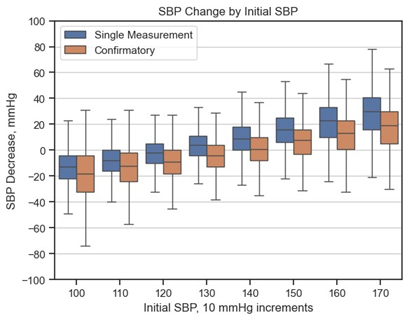Final ID: P-328
Regression to the Mean: Do confirmatory measurements influence the effect?
Abstract Body: Background: Regression to the mean (RTM) in blood pressure (BP) is a well-established phenomenon wherein a group of individuals selected for high or low BP values will regress toward mean values over time. The influence of confirmatory measurements (CM) of BP, a metric captured within the AMA MAP™ Hypertension (HTN) program, has not been studied within large populations of patients in usual care settings. We compared consecutive outpatient systolic blood pressure (SBP) readings of adults with HTN to further characterize the influence of CM on RTM.
Methods: A patient cohort (N= 197,819) comprised of adults with previously diagnosed HTN from 6 diverse healthcare organizations engaged in the AMA’s quality improvement program, was identified for analysis. Outpatient visits with no treatment adjustments, and with a subsequent outpatient visit at participating sites, were evaluated for change in SBP. Each SBP was identified as having derived from a repeat measurement (confirmatory) or a single reading. The analysis was restricted to paired observations of sequential visit BPs with the same measurement method, CM or single. Linear regression was used to evaluate SBP change, controlling for organization, race, sex, age, initial visit SBP, and days between visits, stratified by measurement type.
Results: A cohort of 197,819 patients with HTN was identified, mean age of 62.2 ± 13.9, initial SBP 131.3 ± 15.2 mmHg. The figure shows the median and interquartile range for change in SBP by 10 mmHg increments of initial SBP, stratified by CM presence. Regression modeling demonstrated that RTM, measured as mmHg fall/mmHg initial, was statistically significantly lower with CM (0.55, 95% CI [0.54 – 0.56]) vs. without (0.59, 95% CI [0.58 – 0.59]). This difference translates to a roughly 5 mmHg decreased effect in RTM for visit pairings with an initial SBP of 140 mmHg.
Conclusion: RTM remains a powerful influence on follow-up SBP, which complicates assessment of response to antihypertensive interventions. Confirmatory BP measurements reduce RTM and may improve assessment of the patient’s true BP and responses to clinical interventions.
Methods: A patient cohort (N= 197,819) comprised of adults with previously diagnosed HTN from 6 diverse healthcare organizations engaged in the AMA’s quality improvement program, was identified for analysis. Outpatient visits with no treatment adjustments, and with a subsequent outpatient visit at participating sites, were evaluated for change in SBP. Each SBP was identified as having derived from a repeat measurement (confirmatory) or a single reading. The analysis was restricted to paired observations of sequential visit BPs with the same measurement method, CM or single. Linear regression was used to evaluate SBP change, controlling for organization, race, sex, age, initial visit SBP, and days between visits, stratified by measurement type.
Results: A cohort of 197,819 patients with HTN was identified, mean age of 62.2 ± 13.9, initial SBP 131.3 ± 15.2 mmHg. The figure shows the median and interquartile range for change in SBP by 10 mmHg increments of initial SBP, stratified by CM presence. Regression modeling demonstrated that RTM, measured as mmHg fall/mmHg initial, was statistically significantly lower with CM (0.55, 95% CI [0.54 – 0.56]) vs. without (0.59, 95% CI [0.58 – 0.59]). This difference translates to a roughly 5 mmHg decreased effect in RTM for visit pairings with an initial SBP of 140 mmHg.
Conclusion: RTM remains a powerful influence on follow-up SBP, which complicates assessment of response to antihypertensive interventions. Confirmatory BP measurements reduce RTM and may improve assessment of the patient’s true BP and responses to clinical interventions.
More abstracts on this topic:
A Longitudinal 20-year Analysis Indicates Acceleration of Cardiometabolic Comorbidities on Dementia Risk
Lihua Huang, Danish Muhammad, Auyeung Tw, Jenny Lee, Kwok Timothy, Abrigo Jill, Wei Yingying, Lo Cecilia, Fung Erik
Acute clinical outcomes following virtual reality implementation in the electrophysiology laboratoryRomano Letizia, Calvelli Pierangelo, Quirino Gianluca, Tomaselli Caterina, Talarico Antonello, Pasqua Pino, Curcio Antonio

